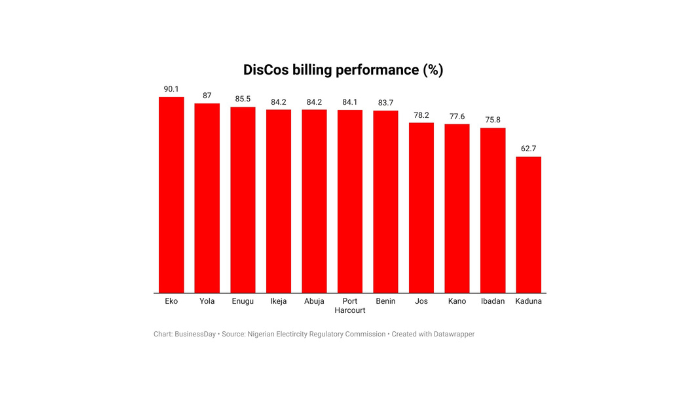Three pivotal charts have unveiled insights into the Distribution Company’s (DisCos) commercial performance for the month of February 2024.
These visual representations, derived from meticulous data scrutiny, shed light on billing performance, collection performance, and revenue recovery performance.
According to the Nigerian Regulatory Commission (NERC), the report said the total energy received from DisCos was 1,759.22 gigawatt-hour (GWh), total energy billed was 2,149.80GWh and billing efficiency was 81.83 percent, signalling a 1.44 percent increase.
Total billings of DisCos stood at N113.05 billion, total revenue collected was N97.01bn, and collection efficiency was 85.82 percent, a 13.06 percent increase from January.
Findings showed the allowed average tariff was N59.89/kilowatt hour (kWh), but the actual average collection was N44.13/kWh, and the recovery efficiency was 75.35 percent, a 13.62 percent increase from January.
According to the report, Eko DisCo had the highest billing efficiency, swiftly followed by Yola DisCo and Enugu DisCo.
Billing Efficiency is an indicator of the proportion of energy that has been billed (includes both metered and unmetered sales) to consumers in comparison to the energy supplied to an area.
Eko DisCo received 262 GWh and billed 236GWh, which brought its billing efficiency to 90.08 percent. Yola DisCo received 67GWh, billed 58.31GWh, and its energy efficiency was 87.04 percent. Enugu DisCo received 161GWh, billed 137.65GWh and had an energy efficiency of 85.50 percent.
The report also stated that Ikeja and Eko recorded the highest collection performance.

Ikeja had a total billing of N17.08 billion and collected N19.58 billion as revenue, bringing its collection efficiency to 114.64 percent, a 27.29 percent increase from January.
Ikeja and Eko DisCos also had the highest revenue recovery performance. Ikeja DisCo’s allowed average tariff was N56.57/kWh, but its actual average collection was N61.84/kWh, which brings its recovery efficiency to 109.31 percent.

Eko DisCo’s allowed average tariff was N59.49/kWh, but it collected N59.98/kWh, which made its recovery efficiency 100.82 percent.
What you should know
The power industry has come under intense scrutiny in the past few weeks following the over 200 percent hike in tariff for Band A customers earlier in April. The hike has attracted criticism from stakeholders, consumers- both individuals and industrial.
The Federal Government has defended the hike, noting that it will attract significant investment into the ailing power sector where electricity distribution companies have failed to make profits in the past years.
It also noted the hike only affects under 20 percent of electricity customers as the tariffs of a majority of Nigerians remain unchanged.
